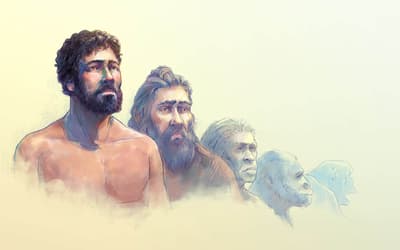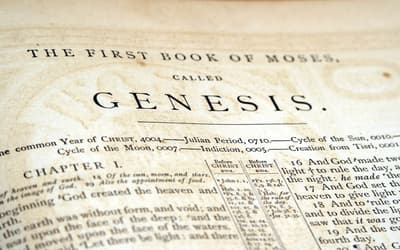The views expressed in this paper are those of the writer(s) and are not necessarily those of the ARJ Editor or Answers in Genesis.
Abstract
Recently a prominent theistic evolutionist claimed that young-earth creationism has reached a point of intellectual bankruptcy, both in its science and theology; young-earth creationism is an unnecessary choice. The purpose of this paper is to evaluate these claims. Of first importance is to know why and when decisions go awry, from both a psychological and biblical perspective. I then present the reasons why four scientists choose to believe that young-earth creationism is a true representation of the biblical record of creation. The third section argues that any understanding of Scripture that excludes or indicts the divine Himself is necessarily flawed and false.
Keywords: choice, decision making, judgment, theistic evolution, young-earth creationism
Introduction
An examination of the writings of several prominent evolutionists has shown that young-earth creationists are rarely accurately portrayed (Bell 2002). They create the impression that creationists are either scientifically incompetent or that the quality of their work falls below accepted scientific standards (Kulikovsky 2008). The aim of such ploys is to dismiss or diminish arguments in support of the biblical teaching of creation. These tactics, however, do not stop with secular evolutionists.
Recently Dr. Francis Collins, a world-renowned geneticist and founder of The BioLogos Foundation,1 wrote that
Young Earth Creationism has reached a point of intellectual bankruptcy, both in its science and in its theology. Its persistence is thus one of the great puzzles and great tragedies of our time. By attacking the fundamentals of virtually every branch of science, it widens the chasm between the scientific and spiritual worldviews, just at a time where a pathway toward harmony is desperately needed (Collins 2007, p. 177).
Collins and president of BioLogos professor of biology, Dr. Darrel Falk, think that the young-earth creationist “perspective is the equivalent of insisting that two plus two is really not equal to four” (Collins 2007, p. 174). Young-earth creationism is therefore an unnecessary and profoundly dangerous choice between the available alternatives (Collins 2007, pp. 178, 211). Collins words his preferred choice as follows: “I find theistic evolution, or BioLogos, to be by far the most scientifically consistent and spiritually satisfying of the alternatives” (Collins 2007, p. 210).
Philosopher Dr. Francis Beckwith agrees with Collins, explaining that he is sympathetic to atheist Richard Dawkins’ bewilderment of why Dr. Kurt Wise—a Harvard University trained paleontologist—
has embraced what appears to many Christians as a false choice between one controversial interpretation of Scripture (young-earth creationism) and abandoning Christianity altogether (Beckwith 2009, p. 58).
Seemingly, Wise’s only mistake is that he has not chosen theistic evolution. Totally absent from Beckwith’s discussion, however, is a presentation of the reasons why Wise chose to believe that young-earth creationism is a true representation of the biblical record of creation.
For the purposes of this paper, I have narrowed the alternatives down to two. The first, the secular evolutionist position is expressed by professor of biology Douglas Futuyma as follows:
Creation and evolution, between them, exhaust the possible explanations for the origin of living things. Organisms either appeared on the earth fully developed or they did not. If they did not, they must have developed from preexisting species by some process of modification. If they did appear in a fully developed state, they must indeed have been created by some omnipotent intelligence, for no natural process could possibly form inanimate molecules into an elephant or a redwood tree in one step (Futuyma 1983, p. 197).
The second alternative, the theistic evolutionist position, is represented by philosopher Richard Swinburne. In his words, it
is immensely unlikely that there would be humans unless either God made them by special creation, or made just those laws and provided just those conditions which would allow the evolution of humans from some initial state of the Universe. In 1859 Darwin produced his explanation of why there were complexly organized humans and animals in terms of the laws of evolution operating on much simpler organisms. His explanation is surely correct (Swinburne 2001, p. 315).
It is clear that the atheistic and theistic evolutionist positions place before the decision maker a forced choice: either the one or the other option, but not both. In other words, either a grammatical-historical understanding of the biblical record of creation (a special creation in mature form in six literal days of 24 hours each) or evolution over billions of years, including the assumption that humans evolved from some ape-like creatures and the existence of suffering and death before the Fall.
In the rest of this paper I will show why and when decisions go awry, from both a psychological and biblical perspective. I will then present the reasons why four scientists choose to believe that young-earth creationism is a true representation of the biblical record of creation: Drs. Jerry Bergman, Jonathan Sarfati, Andrew Snelling, and Kurt Wise. The third section will offer the following argument: any understanding of Scripture that excludes or indicts the divine Himself is necessarily flawed and false.
Section I: Why Decisions Go Awry
Decision implies judgment and choice—the word “decision” means “to cut” between alternatives (Drummond 2001, p. 7). According to Robert Sternberg the “goal of judgment and decision making is to select from among choices or to evaluate opportunities” (Sternberg 2003, p. 404). Michael Eysenck and Mark Keane refer to judgment as the process by which people draw conclusions from the knowledge and evidence available to them (Eysenck and Keane 2000, p. 475).
Firstly, judgment and decision making are what cognitive psychologists refer to as higher-order mental functions of a person; it involves the intellect. Secondly, there exists an integral link between the two, but judgment logically is the primary factor. In other words, more important than a decision (or choice) is the process which leads a person to choose between two or more alternatives. The same point can be expressed in the reverse: the quality of one’s choices depends on the sophistication of the preceding judging process. Thirdly, a decision maker’s judgment always happens in relation to some point of reference, in this case knowledge and evidence. The point of reference serves at least five purposes: (1) it directs interpretation of data; (2) it provides the rationale (reasons) why a decision maker chooses for or against a particular alternative; (3) it helps the decision maker to make sense (the comprehending, understanding, explaining) of puzzles, such as the persistence of young-earth creationism that is a puzzle to Collins; (4) it provides standards or rules for perceiving, believing, and action; (5) the point of reference assumes the status of authority. In sum, how decision makers judge, why, and with what effects are central questions for people interested in decision making. Finally, since conclusions are the end result of the mental process of judging, it is important to know that conclusions rest on, or follow from, premises (suppositions, propositions). Premises include both factual content and value content. The crucial point is that choices involve both. As we shall see, for young-earth creationists, the facts of Scripture cannot be separated from the value of Scripture, just as the value of Scripture is inseparable from the facts recorded in it.
It will therefore be useful to note the reference points of, respectively, young-earth creationists and theistic evolutionists. Young-earth creationists make the following two affirmations and denials:
We affirm that the scientific aspects of creation are important, but are secondary in importance to the proclamation of the gospel of Jesus Christ as Sovereign, Creator, Redeemer and Judge.
We deny that the doctrines of Creator and creation can ultimately be divorced from the gospel of Jesus Christ, for the teachings of Genesis are foundational to the gospel and indeed to all biblical doctrines (directly and indirectly).
We affirm that the 66 books of the Bible are the written word of God. The Bible is divinely inspired and inerrant throughout (in all the original autographs). Its assertions are factually true. It is the supreme authority, not only in all matters of faith and conduct, but in everything it teaches.
We deny that the Bible’s authority is limited to spiritual, religious, or redemptive themes and we deny the exclusion of its authority from its assertions related to such fields as history and science (Mortenson and Ury 2008, pp. 453–454).
In contrast, theistic evolutionists, such as Collins, affirm that “science is the only reliable way to understand the natural world” (Collins 2007, p. 6; cf. Lamoureux 2010, p. 45).2 “Only reliable way” implies, of course, the only authoritative source of knowledge of the natural world. Yet there are phenomena that cannot be explained by science. For example, Dr. Karl Giberson, former professor of physics at Eastern Nazarene College, agrees with Collins that the problem of evil in the world “has no satisfactory answer whatsoever” (Giberson and Collins 2011, p. 128). Collins also admits that “at the present time we simply do not know” how “self-replicating organisms arise” on earth “in the first place”;
No current hypothesis comes close to explaining how in the space of a mere 150 million years, the prebiotic environment that existed on planet Earth gave rise to life” (Collins 2007, p. 90).
Nevertheless, they consider that science is more reliable than the Bible, even on topics about which science is silent. The belief that the complexity of earthly life points to “the handiwork of an intelligent designer” has also now been turned “upside down” by science, says Collins (2007, p. 86). Seemingly, this must be so because once the universe came into existence with the big bang and since evolution got underway no “supernatural intervention was required” (Collins 2007, pp. 200, 201). But Collins also announces the following falsehood: God intentionally “chose the elegant mechanism of evolution to create microbes, plants, and animals of all sorts,” including human beings (Collins 2007, p. 201). The reader will search in vain for a single text or statement in the whole of Scripture where it is written that “God intentionally chose evolution to create life.” It is good to remember that “Every word of God is pure … Do not add to His words, lest He rebuke you, and you be found a liar” (Proverbs 30:5–6).
Instead of affirming the plain meaning of the Genesis record of creation,
That Adam was created from dust and God’s breath; Eve was created from Adam’s rib; the animals, fish and birds were created by divine commands: ‘let there be … ,’
Giberson and Collins state that “None of these ‘explanations’ can possibly be actual descriptions” (Giberson and Collins 2011, p. 206). Genesis 1 and 2 “can best be understood as poetry and allegory rather than a literal scientific description of origins” (Collins 2007, p. 206).
Let us now find out why and when decisions go awry.
Decisions from a psychological perspective
Cognitive psychologists tell us that a problem begins when a problem is not adequately conceptualized. The reason is simple: one’s solution depends on a clear concept (understanding) of a problem (Eysenck and Keane 2000, p. 403; Sternberg 2003, p. 360ff). In the debate between evolutionists and creationists, Collins seems to think that the problem is one of science versus the Bible, hence he writes that young-earth-creationists “see scientific advances as threatening to God” and he seems bewildered that young-earth creationism “is one of the great puzzles and great tragedies of our time” (Collins 2007, pp. 176, 177).
Firstly, what young-earth creationists have argued is that scientific findings are always interpreted in terms of a framework (cf. Oard 2009; Sarfati 1999), be it the age of the earth in geology (cf. Mortenson 2004; Mortenson 2008, pp. 79–104) or the human person as a brain in neuroscience or philosophy (Joubert 2011). Secondly, young-earth creationists have repeatedly and consistently argued that the debate between evolutionism and creationism centers around two issues at the core of their worldview: (1) the nature and character of the Creator, and (2) the authority and inerrancy of Scripture on all matters about which it speaks.3 But nowhere, at least to this writer’s knowledge, has any young-earth creationist rejected empirical scientific findings. Moreover, they have repeatedly and consistently argued that variation within natural (biblical) kinds is a scientific fact, but not atom to animal to human evolution (Sarfati 1999; Spetner 1998). The name logicians created for Collins’ problem is the red herring fallacy. The “red herring” is an argument that diverts the course of a discussion to irrelevant or other topics. In other words, Collins is drawing an irrelevant and false conclusion: young-earth creationists find his evolutionary hypothesis biblically objectionable therefore they are rejecting science.
There is another insight of cognitive psychologists relevant to our discussion. When a person is faced with a choice between alternatives, one must first find out whether the alternative is truly a valid alternative; by checking it against reality. Does it give a coherent and consistent account of the kinds of entities that exist in the world, their natures, and the presence of evil (suffering and death) in the world? There seems to be four options available to the choice between A and B:
- Reject B in favor of A.
- Reject A in favor of B.
- Combine, mix or blend A and B into, say, C.
- Don’t choose.
Option a. and b. is an either/or choice, and c. presents a synthesis, or compromise position. Option c. seems the “harmony view” is the position of theistic evolutionists. Collins puts it as follows: “[T]he BioLogos [theistic evolution] position is the very harmony that it creates between warring factions” (Collins 2007, p. 203).4 There are at least two problems with a harmony view or middle-of-the-road choice.
First, distrust its truth. Why? Proponents of such a choice assume that truth lies in the middle of two opposing positions (for theistic evolutionists, it is between young-earth creationism and secular evolutionism). Given two opposing views and a middle one between them, the truth is just as likely to be at one end of the spectrum as in the middle. It is not to be supposed, however, that the advocacy of a choice on the grounds that it is between two extremes is dishonest. But it is suspect if your only reasons for arguing for its acceptance are because God must have been the cause of evolution and your absolute authority on matters about which the Bible speaks are the inventions of man.5 Second, those who adopt a middle-of-the-road choice tend to obscure real differences between opposing positions. Theistic evolutionists adopt a card-stacking approach to both Scripture and science, which “ignores evidence on the other side of a question. From all the available facts, the person arguing selects only those that will build the best (or worst) possible case” (Troyka 1996, pp. 146–147). For example, Alex Williams’ (2006) review of Falk’s (2004) book, Coming to peace with science: Bridging the worlds between faith and biology, led him to conclude that
Falk selects evidence to suit his argument, is ignorant of YEC [young-earth creationism] critiques of his material, and so fails to critically assess the real issues (Williams 2006, p. 48).
Prominent University of Chicago professor of evolutionary biology Jerry Coyne concluded his review of two books by theistic evolutionists this way:
Attempts to reconcile God and evolution keep rolling off the intellectual assembly line. It never stops, because the reconciliation never works (Coyne 2009).
A third thing cognitive psychologists share with
us is: people often tell others what they want them to
hear or out of a fear of what others would say of them.
When this happens, we are most vulnerable to danger
(Drummond 2001, pp. 21ff.). According to Scripture,
“The fear of man brings a snare …
” (Proverbs 29:25),
and the tendency to give in under peer or cultural
pressure is nowhere more evident than in Galatians 2:11–14.
In the words of Terry Mortenson: “Paul
describes Peter’s succumbing to it as he fell into
hypocrisy and subtle gospel-subverting behaviour
because of the fear of man” (Mortenson 2008, p. 80).
Collins quotes Augustine who said, amongst other things, that “it is a disgraceful and dangerous thing” for an unbeliever to hear a Christian, “presumably giving the meaning of Holy Scripture,” talking nonsense of topics that cannot be verified from the Bible. But Augustine also thought that Christians ought to show that their Scriptures do not contradict the “facts which [the unbelievers] have learned from experience in the light of reason” (Collins 2007, p. 157). However, if it is assumed that Augustine’s words mean that Christians are at liberty to re-interpret the plain meaning of the biblical record of creation in ways that is acceptable to the scientific consensus, then we will strongly disagree.6 A different way to make the same point is to note that a green traffic light means that we have a right of way at a junction. It does not mean that the road is clear.
Because we are faced with a problem—a choice between opposing views—it is important to muster sufficient information about the alternatives. However, important to know is what the provider of the information wants you not to consider. We have already noted that Giberson and Collins are adamant that the description of Adam being created from dust and God’s breath, and Eve being created from Adam’s rib or side cannot “possibly be actual descriptions” (Giberson and Collins 2011, p. 206). Why can they not be actual descriptions? If they are, then theistic evolutionists cannot continue believing that Eve evolved from some ape-like creature.
In other words, the existence of Eve and how she
was created by the Creator serve as barriers to the
credibility of the evolutionary story of origins. In
1 Corinthians 11:8 Paul wrote that “… man is not
from woman, but woman from man
” (cf. verse 12).
1 Timothy 2:13 also unequivocally states, “For
Adam was formed first, then Eve.
” Contra Giberson
and Collins, the apostle Paul believed that Genesis
is recorded history, thus that Eve’s special creation
is a true description of what actually happened. Is
Jesus’ view of the Genesis record ever given the due
attention that it deserves? If not, why not?
Decisions “prove a bust when assumptions unravel” (Drummond 2001, p. 253). It is dangerous to forget that people base their choices on assumptions (beliefs). One way to detect assumptions is by analyzing the information pertaining to each alternative and comparing the result with one’s point of reference. The assumptions that are untrue are the ones that should engage our attention. Illusions mean we see things as better than they are; delusions are where we see things that are not there at all. It is therefore good to remember that truth cannot disprove truth.
Let us now see what we can learn from Scripture about choices. There is no better place to begin than right in the beginning.
Decisions from a biblical perspective
It is well-known that the Creator instructed Adam
to eat freely from the trees in the Garden except one:
“the tree of knowledge of good and evil.
”
It is also known that God said to him that “in the day that
you eat of it you shall surely die
” (Genesis 2:16–17).
Shortly after Eve’s creation, Satan paid her a visit. To
understand the nature of her temptation by Satan, we
have to shift our attention for a moment.
The apostle Paul reminded Christians that the tempter and deceiver’s goal is to take “advantage” of them, and to that end employ various “devices” (plans, tactics) (2 Corinthians 2:11). One of evolutionists’ favorite ploys is to raise doubt in the nature and character of the Word of God. The reason is very simple: if they can succeed in raising doubt in the minds of people about its truthfulness, then it is a very short step before they will reject its authority. In the Garden of Eden, Satan succeeded in doing exactly that, hence the apostle Paul’s warning to Christians:
But I fear, lest somehow, as the serpent deceived Eve by his craftiness, so your minds may be corrupted from the simplicity that is in Christ (2 Corinthians 11:3).
In the Garden, Satan approached Eve with what God had indeed spoken, but with a twist. He admitted its truth in the form of a question, and then went on to deny its literal meaning (Genesis 3:1, 4). Satan’s issue with the spoken word of God at the beginning of creation is again evident at the time he confronted the incarnate Word of God by means of the written Word of God, right before He commenced His public ministry (Matthew 4:1–10; cf. Luke 4:1–13). Four points are worth highlighting here.
We have already alluded to the first point. Satan’s
work has never changed since the beginning of
creation; his special target is Christians, and his
aim is to get them to doubt and deny the Word of
God. Second, Satan’s use of Scripture to tempt
Jesus suggests that he did not doubt its content for a
moment; instead he used it out of context to put Jesus
to the test. Third, Jesus answered the deceiver three
times with “It is written …
”
(Matthew 4:4, 7, 10),
which confirms beyond question the nature (truth
and authority), value and purpose of the inspired
Scriptures. As Paul states,
All Scripture is given by inspiration of God, and is profitable for doctrine, for reproof, for correction, for instruction in righteousness, that the man of God may be complete, thoroughly equipped for every good work (2 Timothy 3:16–17).
The word “all” at the beginning of this text cannot
possibly mean “some” of the Scripture. This is also
confirmed by how Jesus answered Satan: “… Man
shall not live by bread alone, but by every word that
proceeds from the mouth of God
” (Matthew 4:4).
Although Jesus used “word” in the singular, to reinforce
His point, He qualified it with “every.” In other words,
He accepted the inspiration and authority of every
single word that God had given, without exception.
What Scripture says is what God says. It is therefore
not strange that the apostle Paul instructed Timothy
to present himself to God as “… a worker who does
not need to be ashamed, rightly dividing the word of
truth
” (2 Timothy 2:15; cf. Proverbs 30:5–6).
Scripture says that Eve took fruit from the forbidden
tree and ate; “… She also gave to her husband with
her, and he ate
” (Genesis 3:6). And since Adam was
not deceived by Satan (1 Timothy 2:14), we have
reason to think that Adam deliberately decided to
set himself and his judgment up over and against the
command God had given to him. What can we learn
from this?
First, no decision maker is without boundaries, be it a rule, command, law, procedure, or protocol. These boundaries are set to limit what we can and cannot do. And the same applies to a Christian’s beliefs. The Bible, God’s written Word, does not allow us to believe just anything. If that were not so, then, for example, 2 Corinthians 10:5 and Jude 3 would not make sense.7
Second, everyday experience teaches us that people are forever testing boundaries; of course, in order to see what they can get away with (cf. Ecclesiastes 8:11). The very exercise of judgment implies discrimination or distinguishing between two options, and this seems to be exactly the case with Adam. His judgment was that he could get away if he chooses a different point of reference than the one given to him by our Creator: the word of God!
Third, the Bible not only reveals that choice is a
particular human power, but also that God confronts
His people with choices after the Fall. In Deuteronomy 30:19,
Moses “… set before
[the Israelites] life and
death, blessing and cursing.
” He then asked them to
“choose life, that both you and your descendants may
live.
” Later in their history, Joshua posed a similar
choice to the Israelites. He asked them to “choose for
yourselves this day whom you will serve, whether the
gods … But as for me and my house, we will serve the
Lord
” (Joshua 24:15). It is therefore not altogether
strange that Jesus told His disciples that “No one can
serve two masters; for either he will hate the one and
love the other, or else he will be loyal to the one and
despise the other. …
” (Matthew 6:24). These texts
make it evident that the choice is an either/or one, and
not something from both; the objects are mutually
exclusive. It is therefore correct to conclude that
God does not settle for middle-of-the-road choices (cf.
Revelation 3:14–16), at least not where truth, loyalty,
and authority are the issues at stake.
Section II: Young-Earth Creationist Scientists
In In six days: Why 50 scientists choose to believe in creation (Ashton 2000), we find the reasons why 50 scientists made creation in six literal days of 24-hours each their preferred choice. As previously indicated, I present the reasons, albeit very briefly, of Drs. Jerry Bergman, Jonathan Sarfati, Andrew Snelling, and Kurt Wise. Careful reading of their testimonies reveals that their choice is undergirded with two or more arguments. I have taken the liberty to identify some of them here.
Jerry Bergman
Bergman holds a B.S. and M.S. in psychology, a Ph.D. in evaluation and research, an M.A. in sociology, and a Ph.D. in human biology. He offered two arguments in support of his belief in a six-day creation: an argument for instantaneous creation and an argument from design and irreducible complexity.
Bergman asks, “Where did life come from?” And, “What is the purpose of life?” Following the answers of the atheist and creationist respectively, Bergman presents the following thesis: life on earth could not have originated by way of a gradual process, but must have been instantaneous. His first example is a mousetrap, which is an assemblage of separable parts and arranged in a certain structure. Bergman makes two points. First, every machine has a certain number of minimum parts to function properly. Second, all the parts have to be in place at the same time for it to function. If one part is removed, the machine will cease to function.
Bergman then registers an objection to his argument, and that is that certain machines are able to operate with one less part. In the case of the trap, the base can be removed and fastened to the floor. However, the floor he argues, is just another base; but, and this is Bergman’s point, the trap cannot operate or come into existence without an intelligence who designed and assembled it. The mousetrap, in other words, speaks of intelligent design.
Can this understanding of a machine be extended to the creation process which produced life? Bergman thinks it can, and uses several more examples to substantiate his argument, for example, a cell, bacteria, viruses, simple life-forms, a zygote, the creation of Adam in mature form, and the universe. The details will take us beyond the scope of this paper, and I therefore highlight only a few points.
First, the challenge for the evolutionist is to provide an account for both the parts necessary for life (DNA, RNA, proteins) and their proper assembly. Bergman points out that many parts of life cannot evolve (as evolutionists believe they do) without them evolving simultaneously with others. Some parts, in other words, cannot “wait” for other parts to evolve. For this reason, only instantaneous creation of all the necessary parts as a functioning unit can produce life. He says,
No compelling evidence has ever been presented to disprove this conclusion, and much evidence exists for the instantaneous creation requirement, such as the discovery that most nucleotides degrade rather fast at the temperatures scientists conclude existed on the early earth (Irion 1998) (Ashton 2000, pp. 27–28).
Second, one of the most compelling evidences in support of instantaneous creation comes from everyday knowledge of the world, and that is that information does not come about by chance. If left to itself, disorder usually soon results. In other words, only a being with intelligence can produce information and keep it from collapsing into disorder. That a complex structure such as a living organism could be formed by chance without intelligent input has never been demonstrated in the lab or anywhere else. Bergman then illustrated that the probability of life arising by chance is so remote that many researchers have to label it an impossibility.
Bergman concludes that time alone cannot allow for the construction of life in the absence of deliberate intelligent design, no matter what the initial conditions might have been. It is for this reason that evolutionists consider human beings as “a glorious evolutionary accident (Gould 1989, see also Kayzer 1997, p. 92)” (Ashton 2000, p. 37). In a word, it is impossible for life to come from non-life or for something to originate itself.
Jonathan Sarfati
Sarfati holds a Ph.D. in physical chemistry, and presents an argument from Scripture and an argument from designed perfection. He begins by stating that there are excellent evidences from archaeology, science, fulfilled prophecy, and the claims of Jesus Christ to support the Bible’s claim to be the written Word of God, “completely authoritative on everything it teaches (2 Timothy 3:15–17)” (Ashton 2000, p. 78). His point of departure in showing scientific evidence for design in nature is Romans 1:20:
For since the creation of the world His invisible attributes are clearly seen, being understood by the things that are made, even His eternal power and Godhead, so that they are without excuse, …
Sarfati’s thesis is that all the wonderful works of design in this world point to a great designer; an intellectually honest person cannot conclude otherwise. He acknowledges that our sin-cursed world (Genesis 3:16–19; Romans 8:20–23) serves as evidence that many of the Creator’s original designs are no longer benevolent, and that others have deteriorated because of mutations. Despite the fact that God’s designs have been marred by sin in the world and God’s curse on creation, there are many structures that have retained their physical perfection. He then lists and briefly discusses some of these structures, such as the dolphin’s sonar system (a dolphin can detect a fish the size of golf ball at a distance of 230 ft or 70 m), the complicated flight movements of insects, the complexity of a self-reproducing organism and its genetic information, the rotary system that drives the flagellum of bacterium, the complex compound eyes of some trilobites, lobster eyes, and our chemical-detecting sense (smell).
Sarfati then compares chemical evolutionary theories with the facts of chemistry, and provides and discusses evidence that refutes the evolutionist belief that all life originated from some “chemical soup” (Ashton 2000, pp. 81–84). One piece of evidence is worth highlighting, and is therefore presented in full. Sarfati says:
Many of life’s chemicals come in two forms: “left-handed” and “right-handed.” Life requires polymers with all building blocks having the same “handedness” (homochirality)—proteins have only “left-handed” amino acids, while DNA and RNA have only “right-handed” sugars. Living things have special molecular machinery to produce homochirality. But ordinary undirected chemistry, as in the hypothetical primordial soup, would produce equal mixtures of left- and right-handed molecules, called racemates. Racemic polypeptides could not form the specific shapes required for enzymes; rather, they would have the side chains sticking randomly. Also, a wrong-handed amino acid disrupts the stabilizing α-helix in proteins. DNA could not be stabilized in a helix if even a small proportion of the wrong-handed form was present, so it could not form long chains. This means it could not store much information, so it could not support life [Thiemann 1973, pp. 32–33]. A small fraction of wrong-handed molecules terminates RNA replication [Joyce et al. 1984, pp. 602–604]. A recent world conference on “The Origin of Homochirality and Life” made it clear that the origin of this handedness is a complete mystery to evolutionists [Cohen 1995, pp. 1265–1266] (Ashton 2000, p. 82).
Sarfati concludes his testimony on the following note:
I believe in a recent creation in six consecutive normal days because the only eyewitness tells us this is what He did, and He has shown that He should be trusted. He also makes it clear that no death (of the nephesh animals) occurred before Adam’s [sin]. While this requires faith, it is a faith amply supported by science, as I can confirm from my own specialist field (Ashton 2000, p. 84).
Andrew Snelling
Snelling holds a Ph.D. in geology and believes that life originated on earth over a period of six literal days followed later by a year-long geological catastrophe that totally renovated the earth’s surface. He offers three arguments. The first is his argument from Scripture: that is what the Bible teaches,
not only in the opening chapters of the Book of Genesis, but also throughout the Old and New Testaments, including being confirmed by Jesus Christ himself (Ashton 2000, p. 291).
Snelling draws attention to an important point that is often forgotten by those interested in the debate between creationists and evolutionists of whatever stripe, and that is no matter how clever scientists are in their research, they can only study all the evidence as it exists today and then extrapolate backwards into the past. In order for that to be successful, scientists have to make assumptions, and can therefore not hold their findings and their interpretations of what happened with absolute certainty. In contrast to scientific tentativeness is the Bible, which claims over 3,000 times to be the Word of God, who is not only transcendent and personal, but also omniscient and totally truthful. Thus, when one compares the biblical account of the origin of life and the global Flood with the evolutionary view of many millions of years of billions of creatures living and dying through countless geological ages, it quickly becomes obvious that there are irreconcilable contradictions between them. So we are faced with an either/or choice: either the evolutionary view of the evidence is true, or that of the biblical record of creation in six literal days, no death and suffering prior to the Fall, and the global Flood. Snelling’s choice is the trustworthiness of Scripture and the nature and character of the Creator:
It follows then that having made one’s decision about the reliability and truthfulness of these events as recorded in the Bible, ultimately by God himself as claimed, there is no reason why the truthfulness of the Bible cannot be tested historically and scientifically (Ashton 2000, pp. 292–293).
Snelling’s second argument is an argument from
complex design. He tells us that his favorite example is
the trilobites, arthropods (invertebrates with jointed
legs) that are extinct and only found as fossils. Their
anatomy reveals that they are, perhaps, the most
complex of all invertebrate creatures. Snelling points
out that some scientists believe that the aggregate
(schizochroal) eyes of some trilobites were the most
sophisticated optical systems ever utilized by many
organisms. Although their complexity is regarded as
“primitive,” it creates a dilemma for the evolutionist:
there “are no possible ancestors to the trilobites in the
rock layers beneath where the trilobites are found, for
example, in the Grand Canyon” (Ashton 2000, p. 294).
The evidence reveals that the trilobites appeared
very suddenly in the geological record, fully formed,
and as complexly integrated creatures with the most
sophisticated systems ever used by an organism.
Since there are no clues as to how the complexity of
trilobites arose, the natural conclusion is that they
have been designed and created in mature form by
God’s “Let the earth bring forth . . . and it was so
” (cf. Genesis 1:24).
Snelling also focuses on the Flood. Three points are noteworthy. First, it is logical to predict that the Flood event would leave behind billions of dead animals and plants buried in sediments eroded and deposited by the moving flood waters, that they would end up being fossils in rock layers laid down by water all over the globe. And that is exactly what geologists find. Second, evidence shows that the fossil deposits and rock strata were formed catastrophically. Snelling presents and discusses some of the evidence found in the Grand Canyon. And third, no geologist denies that the oceans once covered the land, and that is exactly what one would expect from a Bible that is true.
After discussing ongoing research, Snelling sums up his reasons for believing in a creation of six literal days and God’s destruction of life and the earth by a year-long cataclysmic global Flood as follows:
first, and foremost, because the Bible clearly records these events as real, literal history, and second, because the scientific evidence, correctly understood, is totally consistent with this biblical account (Ashton 2000, p. 300).
Kurt Wise
Wise holds a Ph.D. in paleontology, and his testimony is more a narrative of the process of how he arrived at his choice of young-earth creationism. In short, an earth that is millions of years old clashed with the convictions he holds about the Bible. In his words,
I am a young-age creationist because that is my understanding of Scripture. As I shared with my professors years ago when I was in college, if all the evidence in the universe turned against creationism, I would be the first to admit it, but I would still be a creationist because that is what the Word of God seems to indicate. Here I must stand (Ashton 2000, p. 355).
In the beginning of this paper, I pointed out that Wise’s choice is somewhat bewildering to both the atheist Richard Dawkins and the theistic evolutionist Francis Beckwith. I have also pointed out that it seems that Wise’s only mistake seems to be that he did not make theistic evolutionism his preferred choice. It would therefore be useful to see what sort of evidence Wise offers in support of young-earth creationism.
He says that the best extra-biblical evidence for creation comes from the design of organisms past and present. He refers to the schizochroal compound eye of the trilobite (a horseshoe crab-like organism) which “contains the only known lens in the biological world which corrects for focusing problems that result from using non-flexible lenses” (Wise 1998). The designs of the lenses, he says, are the very same designs that man himself has developed to correct for the same problems. Moreover, the design of this eye “combines this optimum focusing capability with the optimum sensitivity to motion provided by the compound eye as well as the stereoscopic (3-D) vision provided by closely spaced eyes” (Wise 1998). In short, the schizochroal eye of the trilobite is unique among eyes. Therefore, the origin of its design cannot be accounted for in terms of any natural cause. “Among available hypotheses, creation by God is the most reasonable hypothesis” (Wise 1998).
Wise also discusses several characteristics of human population and genetics which he believes are “more easily explained by the Biblical scenario of human history than they are explained by the conventional, evolutionary view of human history” (Wise 1999, p. 3).
Concluding Comments
By way of summary, it is evident that the judgment and choice of each of the scientists reflect the workings of the mind within a distinctive Christian (biblical) worldview. They have a clear grasp of the evolution and creationist controversy; they use the Scriptures as their point of reference, without rejecting the scientific evidence. In other words, they use Scripture to anchor their science; they consider the evidence for and against their choice, and are fully aware of the assumptions driving the evolutionary hypothesis of the origin of the world and life on earth.
The divine inspiration of Scripture
What I wish to do next is to offer an argument in support of their view of Scripture because many theistic evolutionists believe that neither our Scriptures nor our Lord Jesus Christ is without error. Or to state this affirmatively, many theistic evolutionists have to believe both the Scriptures and the Lord Jesus Christ are in error. Giberson and Collins, for example, say that it is a mistake to assume that the “concept of inspiration” entails the “factual accuracy” of Scripture, “as though God’s role were nothing more than a divine fact checker, preventing the biblical authors from making mistakes” (Giberson and Collins 2011, p. 102). Biblical scholar and also writer for BioLogos, Kenton Sparks, rightly affirms that the evangelical “tradition commonly holds that God, in giving us Scripture, shielded it from the inerrant influences of its finite, fallen human authors” (Sparks 2010, p. 2). However, he concludes that it is a mistake; the evidence points in the opposite direction:
If Jesus as a finite human being erred from time to time, there is no reason at all to suppose that Moses, Paul, [and] John wrote Scripture without error (Sparks 2010, p. 7).
Any understanding of Scripture that excludes or indicts the divine Himself is fundamentally flawed and false. For the purposes of the discussion, I will assume that Jesus and the writers of the New Testament had a literal-historical understanding of Genesis 1–11. It appears that Dr. Denis Lamoureux spoke for all theistic evolutionists when he admitted that the
greatest problem with evolutionary creation is that it rejects the traditional literal interpretation of the opening chapters of Scripture. … Even more troubling for evolutionary creation is the fact that the New Testament writers, including Jesus Himself, refer to Genesis 1–11 as literal history (Matthew 19:4–6; Romans 5:12–14; Hebrews 4:4–7; 2 Peter 2:4–5) (Lamoureux 2010, p. 4).
However, it is possible to reason that only some of Scripture is inspired. Alternatively, one could always reason that Jesus and the writers of the New Testament were mistaken in their understanding; they were human, and to be human implies and entails error.
The person who wishes to claim that only some of
Scripture is inspired by God is facing at least three
immediate obstacles. First, such a claim excludes
the source of inspiration and contradicts Scripture:
“All Scripture is given by inspiration of God, and is
profitable for doctrine, for reproof, for correction, for
instruction in righteousness,
” (2 Timothy 3:16).
Second, if it is true that only some of Scripture is inspired, then not all Scripture is profitable for teaching, for reproof, for correction and training in righteousness. However, it is impossible for God to lie (Hebrews 6:18; Titus 1:2). Thus, to claim that only some Scripture is inspired and profitable is tantamount to thinking that two truths—God and the Word of God—could oppose each other, or that a proposition could be simultaneously true and false, which is absurd; truth can not be opposed to itself.
Third, if only some of Scripture is inspired and
profitable, then not all of its teachings are accurate. If
so, then it becomes impossible to formulate coherent
doctrines from it. Moreover, it would be egregious
to think that Christians should hold their beliefs
tentatively, since theistic evolutionism implies and
entails that science serves as arbiter of matters about
which the Bible clearly speaks. Can science verify
that a virgin could become pregnant apart from the
seed of a man, that Jesus turned water into wine in
an instant, or that He was resurrected from the dead?
Should the errors of Jesus’ teaching be restricted to
what He believed about Genesis 1–11, and if so, by
what standard should it not be extended to what He
taught about Jonah and the big fish or the future?
Jesus said, “If I have told you earthly things and you
do not believe, how will you believe if I tell you heavenly
things?
” (John 3:12). Anyone who wishes to place
restrictions on His teachings based in historical facts
must, to be consistent, extend those restrictions to
His spiritual teachings. The following example clearly
illustrates that the Bible’s historical statements are
fundamental to its spiritual truth. Paul said, “This
is a faithful saying and worthy of all acceptance, that
Christ Jesus came into the world to save sinners,
of whom I am chief
” (1 Timothy 1:15). If we cannot
be certain that Jesus came into the world, then we
cannot be certain that He came to save sinners. And
if we cannot be certain that Jesus died, was buried,
and rose bodily from the dead, then Christians’ faith
is in vain and they are still in their sins and can have
no hope of resurrection after their own deaths
(1 Corinthians 15:1–19). The fact that about two thirds
of the Old Testament and over one third of the New
Testament were written in historical narrative shows
that the history of the Bible is foundational to its
theology and morality.
The objection that neither Jesus nor the apostles were inerrant rests on two assumptions: (1) humans are finite; because they are finite, they are subject to limitations (for example, it is possible to make mistakes); (2) they did not possess exhaustive knowledge (for example, Jesus did not know when the end of the world would come—Mark 13:32). There are three major reasons why this kind of reasoning cannot stand. The first is because the logic does not make sense. If this kind of reasoning is correct, then the following inferences must also be true, which is absurd: (a) no child of, say, between 3 and 15 can ever speak the truth, for they are human, and (2) no one (including scholars who refer to themselves as theistic evolutionists) can ever claim to speak the truth about anything for no one has exhaustive knowledge of everything.
However, the simple fact is that children can and do speak the truth. Thus, to be human and have limitations does not necessarily imply and/or entail error. The second reason is Paul claimed to have received his gospel through a revelation of our resurrected Lord and Saviour (Galatians 1:11–12). Now if what Paul believed about Genesis 1–3 was wrong, then Jesus could not have been right in what He believed about those same chapters. So, if Paul was wrong then Jesus must have revealed falsehood to Paul, and that is a serious indictment against our Creator.
Scripture reveals that Jesus promised His disciples that He would send a Helper to them after His ascension to the Father: the Spirit of truth (John 15:26–27; cf. 14:26). Now if Jesus intended that His disciples would one day write inspired Scripture, do we have any reason to think that the outcome would be full of human mistakes and errors about history? It suffices to make two points. First, Christians have no Christ except the one whom the apostles have given to them. The apostles were dependent on our Lord for the truth of their teaching and knowledge, as we are dependent on them for ours. Second, if Christians discredit those on whose testimony alone their beliefs and doctrines depends, then, they must assume that what Jesus taught the apostles could not have been true. It can mean nothing less than Jesus became an accomplice in error and falsehood. We thus see, to the extent that the apostles are discredited as authoritative teachers of truth, to that extent our Lord is discredited with them.
The third reason why the objection that neither
Jesus nor the apostles were inerrant cannot hold
is because it rests on a misconception of the nature
and character of the Creator. It is true, God used the
unique thinking, life experiences, and writing styles
of the human authors to pen Scripture, but we have
no reason to think that their humanness corrupted
the final result with errors. They were writing for
God and by His Spirit. God is a God of truth (Isaiah 65:16);
He cannot lie, and His “eyes are purer than
to behold evil
” (Habakkuk 1:13). It would have been
an evil thing if God allowed the writers of Scripture
to record what they believed to be true, but which
God knew was actually false. The same point can
also be stated differently: It is an egregious thing to
think that the Creator allowed Jesus and the writers
of Scripture to hold false beliefs about the Genesis
record of creation, for example, the special creation of
a literal Adam—on the sixth day of creation (Genesis 1:26–31), directly, separately from animals, and
in mature form (Genesis 2:7)—and then waited for
followers of Lyell and Darwin to reveal to Christians
how He actually created the world. Therefore, to posit
errors in Scripture is to exclude or indict the divine
Spirit of truth, which means this is a fundamentally
flawed understanding of inspiration, and is therefore
false.
Conclusion
We have learned a few things about decision making. Of first importance is to know when and why decisions go awry. How decision makers judge, why, and with what effects are central questions for people interested in decision making. We also learned several things about the debate between biblical Christians (young-earth creationists) and theistic evolutionists. Theistic evolutionists do their best to convince people that the biblical record of creation cannot be trusted as a straightforward historical account because such interpretation is contrary to “science” (by which they mean the evolutionist majority view of origins). But such an approach flies in the face of the arguments and evidence that were presented. Theistic evolutionists also do their best to create the impression that they believe that the Bible is true in matters of faith (that is, salvation and spirituality), but not necessarily always true in its statements related to history or science. But if the Bible is in error in its historical or scientific statements, then how can it be trustworthy in matters of faith?
However, the arguments and evidence presented in this paper reveal if young-earth creationists are intellectually bankrupt, as Collins and some of his fellows aver; if Jesus and the writers of the New Testament believed in a literal-historical record of creation, as theistic evolutionists rightly acknowledge, then what is true of young-earth creationists must be true of Jesus and the writers of the New Testament. But since young-earth creationists hold the same understanding of Genesis 1–11 as their Lord Jesus Christ and the New Testament writers, they can answer the question this paper set out to answer: “Is young-earth creationism a bad choice?” There are at least three reasons: in contrast to theistic evolutionism it inspires confidence in the inerrancy of Scripture; in contrast to theistic evolutionism it inspires confidence in the nature and character of the Creator; and it serves as a rational and profitable alternative to competing views on origins.
Acknowledgments
I wish to thank the reviewers of this paper for their valuable and much appreciated suggestions and corrections.
References
Ashton, J. F. ed. 2000. In six days. Why 50 scientists choose to believe in creation. Green Forest, Arkansas: Master Books.
Beckwith, F. J. 2009. How to be an anti-intelligent design advocate. Retrieved from https://bearspace.baylor.edu/Francis_Beckwith/www/Sites/USTJLPP.pdf on June 26, 2011.
Bell, P. B. 2002. The portrayal of creationists by their evolutionist detractors. TJ 16, no. 2:46–53.
Bergman, J. 2010. Why orthodox Darwinism demands atheism. Answers Research Journal 3:147–152. Retrieved from http://www.answersingenesis.org/articles/arj/v3/n1/orthodox-darwinism-atheism.
BioLogos. About the BioLogos Foundation. Retrieved from www.biologos.org/about on March 11, 2011.
Cohen, J. 1995. Getting all turned around over the origins of life on earth. Science 267:1265–1266.
Collins, F. S. 2007. The language of God: A scientist presents evidence for belief. London, United Kingdom: Pocket Books.
Coyne, J. 2009. Seeing and believing. The New Republic. Retrieved from http://www.tnr.com/article/books/seeing-and-believing on June 11, 2011.
Denton, M. 1985. Evolution: A theory in crisis, new developments in science are challenging orthodox Darwinism. Chevy Chase, Maryland: Adler & Adler Publishers.
Drummond, H. 2001. The art of decision making. Mirrors of imagination, masks of fate. West Sussex, England: John Wiley & Sons.
Eysenck, M. W. and M. T. Keane. 2000. Cognitive psychology. A student’s handbook, 4th ed. East Sussex, United Kingdom: Psychology Press.
Falk, D. R. 2004. Coming to peace with science. Bridging the worlds of faith and biology. Downers Grove, Illinois: InterVarsity Press.
Futuyma, D. J. 1983. Science on trial: The case for evolution. New York, New York: Pantheon.
Giberson, K. W. and F. S. Collins. 2011. The language of science and faith: Straight answers to genuine questions. Downers Grove, Illinois: IVP Books.
Gould, S. J. 1989. Wonderful life: The Burgess Shale and the nature of history. New York, New York: W. W. Norton & Company.
Grigg, R. 1996. How long were the days of Genesis 1? What did God intend us to understand from the words He used? Retrieved from http://creation.com/how-long-were-the-days-of-genesis-1 on March 8, 2011.
Ham, K. 2001. The big picture. Being wrong about the six days of creation does not automatically mean someone is not a Christian. But if you think that makes it unimportant, stand back and look at the big picture. … Retrieved from http://www.answersingenesis.org/articles/cm/v23/n2/bigpicture on February 9, 2011.
Ham, K. 2007. Couldn’t God have used evolution? Retrieved from http://answersingenesis.org/articles/nab/couldnt-god-have-used-evolution on February 2011.
Ham, K., T. Mortenson, and C. Wieland. 2003. Are (biblical) creationists ‘cornered’?—A response to Dr J. P. Moreland. TJ 17, no. 3:43–50.
Irion, R. 1998. Ocean scientists find life, warmth in the seas. Science 279, no. 5355:1302–1303.
Joubert, C. 2011. What makes us human, and why it is not the brain: A creationist defence of the soul. Answers Research Journal 4:217–232. Retrieved from http://www.answersingenesis.org/articles/arj/v4/n1/human-brain-soul.
Joyce, G. F., G. M. Visser, C. A. van Boeckel, J. H. van Boom, L. E. Orgel, and J. van Westeren. 1984. Chiral selection in poly(C)-directed synthesis of oligo(G). Nature 310:602– 604.
Kayzer, W. 1997. A glorious accident: Understanding our place in the cosmic puzzle. New York, New York: W. W. Freeman & Co.
Kulikovsky, A. S. 2007. Creation and Genesis: A historical survey. Creation Research Society Quarterly 43:206–219.
Kulikovsky, A. S. 2008. Creationism, science and peer review. Journal of Creation 22, no. 1:44–49.
Lamoureux, D. O. 2010. Evolutionary creation: Moving beyond the evolution versus creation debate. Christian Higher Education 9, no. 1:28–48.
Mook, J. R. 2008. The church fathers on Genesis, the Flood and the age of the earth. In Coming to grips with Genesis. Biblical authority and the age of the earth, ed, T. Mortenson and T. H. Ury, pp. 23–52. Green Forest, Arkansas: Master Books.
Mortenson, T. 2004. Philosophical naturalism and the age of the earth: Are they related? The Master’s Seminary Journal 15, no. 1:71–92.
Mortenson, T. 2008. “Deep time” and the church’s compromise: Historical background. In Coming to grips with Genesis. Biblical authority and the age of the earth, ed. T. Mortenson and T. H. Ury, pp. 79–104. Green Forest, Arkansas: Master Books.
Mortenson, T. and H. Ury. 2008. Affirmations and denials essential to a consistent Christian (biblical) worldview. In Coming to grips with Genesis. Biblical authority and the age of the earth, ed. T. Mortenson and T. H. Ury, pp. 453–458. Green Forest, Arkansas: Master Books.
Mortenson, T. 2009a. Creation theodicy in light of Genesis and modern science: A young-earth creationist response to William Dembski. Answers Research Journal 2:151–167. Retrieved from http://www.answersingenesis.org/articles/arj/v2/n1/dembskis-theodicy-refuted.
Mortenson, T. 2009b. Systematic theology texts and the age of the earth: A response to the views of Erickson, Grudem, and Lewis and Demarest. Answers Research Journal 2:175–200. Retrieved from http://www.answersingenesis.org/contents/379/arj/v2/Systematic_theology_Erickson_Grudem_Lewis.pdf.
Oard, M. J. 2009. Poor scholarship and self-deception. Journal of Creation 23, no. 2:47–52.
Sarfati, J. 1999. Refuting evolution. Brisbane, Australia: Answers in Genesis.
Sparks, K. 2010. After inerrancy. Evangelicals and the Bible in a postmodern age. Retrieved from http://biologos.org/uploads/static-content/sparks_scholarly_essay.pdf on April 25, 2011.
Spetner, L. 1998. Not by chance! Shattering the modern theory of evolution. New York, New York: The Judaica Press.
Sternberg, R. J. 2003. Cognitive psychology, 3rd ed. Belmont, California: Wadsworth/Thomson Learning.
Swinburne, R. 2001. Natural theology in the light of modern cosmology and biology. Pontificiae Academiae Scientiarum Scripta Varia 99:310–317.
Thiemann, W. ed. 1973. International symposium on generation and amplification of asymmetry in chemical systems. Jülich, Germany, pp. 32–33. Cited in Wilder-Smith, A. E. 1981. The natural sciences know nothing of evolution. Green Forest, Arkansas: Master Books.
Troyka, L. Q. 1996. Handbook for writers, 4th ed. Parsippany, New Jersey: Simon & Schuster.
Williams, A. 2006. Taking firm hold on an illusion. Journal of Creation 20, no. 3:45–49.
Wise, K. 1998. My favorite evidence for creation! Retrieved from http://www.answersingenesis.org/articles/1998/02/16/kurt-wise on July 15, 2012.
Wise, K. 1999. Biblical history of human population. Retrieved from http://www.jashow.org/Articles/_PDFArchives/science/SC1W0899.pdf on July 15, 2012.















